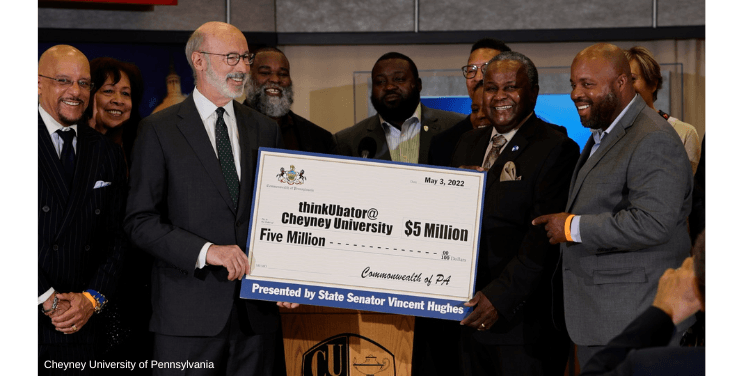Key Insights:
- Cheyney University of Pennsylvania is developing a biotech incubator project for cell and gene therapy research.
- Pennsylvania awarded Cheyney University with a $5 million investment for the ThinkUbator project.
- The ThinkUbator is an extension of the ongoing initiative to bring the operations of science-based companies to Cheyney.
Cheyney University of Pennsylvania, the nation’s oldest Historically Black College and University (HBCU), is working to become a leader in biotechnology research through its new initiative, the ThinkUbator.
ThinkUbator is a biotech incubator project that will offer biologics, cell and gene therapy companies the opportunity to pursue research on the campus by leasing process development and wet lab space in the facility. Last month, Pennsylvania Governor Tom Wolf announced that the state awarded Cheyney University with a $5 million investment for the project. The grant will be used to renovate the Duckrey Social Sciences Center building on campus.
“This investment is another significant step in the resurgence of Cheyney University and its place among the great centers of higher learning in Pennsylvania,” Sen. Vincent Hughes, Cheyney board of trustees member, said in a press release. “This groundbreaking institution is poised to create a future that’s worthy of its storied history. The work is hard but it’s worth it.”
Expanding Life Sciences at HBCUs
The ThinkUbator, designed by Integrated Project Services, LLC, (IPS) which built Pfizer and Moderna’s COVID-19 vaccine labs, will be built in a 70,000-square-foot building. The project is an extension of the initiative that Cheyney has been building since 2017 to bring the operations of life science companies to the university.
In addition to providing a revenue stream to the school, students have paid internship opportunities with the on-campus companies, according to a Cheyney news release.
“The companies already operating on our campus working with our student interns provided proof that our concept works for all parties, the university, the students and the businesses. The businesses we have brought onto our campus and into our lab space have a real interest in being here,” said Cheyney President Aaron A. Walton in a news release.
Cheyney has eight strategic campus partnerships, several of which are with science-based companies that are operating their businesses in its Social Sciences Center including ASI Chemicals, Navrogen and Sure-BioChem Laboratories. One of the partnerships, The Wistar Institute, the nation’s first independent biomedical research institute, does not operate on campus. The Wistar Institute is working with IPS on the ThinkUbator project.
These strategic partnerships allow STEM students to engage in experiential learning. The ThinkUbator will serve to further expand these opportunities, Vanessa Atkins, the director of the Life Sciences and Technology Hub, told The Plug.
“The focus for the ThinkUbator is selling gene therapy and so within the work that those startups are doing, our students will have more opportunity to engage with professionals in those fields. They’ll have more opportunities to get engaged in active projects that have real meaning,” Atkins said.
About 26 percent of Cheyney students are currently in the science, technology engineering and mathematics (STEM) field. There were a total of 627 undergraduate students enrolled in fall 2020. As the STEM student population grows and Cheyney develops more strategic partnerships through the ThinkUbator, so will student opportunity, Atkins added.
Black Developers at the Helm
Mosaic Development Partners, a Philadelphia-based Black-owned real estate development company that helps revitalize neighborhoods and marginalized communities, is leading the ThinkUbator project. Mosaic Development Partners has been working with the university for the last three years along with the Chester County Economic Development Council (CCEDC) to assess real estate, chart needs and pursue opportunities for Cheyney. CCEDC is helping finance the development of the ThinkUbator.
Jordan Reaves, associate controller at Mosaic Development Partners, told The Plug he cannot share which companies are currently a part of the ThinkUbator project, but they are working on expanding partnerships.
According to Reaves, Mosaic Development Partners partnered with Cheyney because a number of members on its team, including himself, attended HBCUs, and they understand the important role HBCUs play in supporting Black students.
“Because our company is a small Black-owned real estate development firm, we realize how important it is for disadvantaged people from disadvantaged neighborhoods to have opportunities at creating wealth,” Reaves said. “We’re really looking at creating more equity and opportunities for students of color in the life sciences.”
The $5 million investment from the state comes through the Redevelopment Assistance Capital Program, a Commonwealth grant program for acquiring and constructing regional economic, cultural, civic, recreational and historical improvement projects. Cheyney also received $400,000 in federal appropriations funding for the first phase of the project, which will cost approximately $10 million to $11 million.
Mosaic Development Partners said it is still working on the financing for the ThinkUbator, with the goal to start construction in early 2023.
Students at Cheyney are enthusiastic about engaging in STEM work outside of the formal classroom setting, so the ThinkUbator is an opportunity to expand and support student interest, Atkins said.
“I’ve had a number of students who were a little leery about going into the lab and then once they went into the lab, I can’t get them out. They may have come here without any knowledge or exposure about what a career as a researcher would look like and as they get more insight about what that entails they can see themselves in those roles,” Atkins said.








